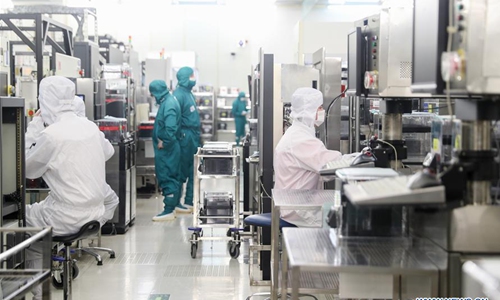HOME >> OPINION
Foreign perceptions won't influence China
By Ding Gang Source:Global Times Published: 2020/2/12 17:05:31

Staff members work at a workshop of a semiconductor company in Shanghai, east China, Feb. 10, 2020. Chinese authorities are carefully balancing efforts to control the novel coronavirus epidemic and minimize its impact on the economy as millions of people head back to work Monday after an extended holiday. (Xinhua/Ding Ting)
The outbreak of novel coronavirus pneumonia has once again provided the world with an opportunity to observe and understand China. The outside world's understanding of China will inevitably carry some prejudice and be influenced by stereotypes. There are also people filled with prejudice who will jump to rash conclusions. It has been only 10 years since China became the second-largest economy worldwide, and the world needs time to know this country.
What the outside world sees from the epidemic is not static but dynamic. The situation in China is undergoing rapid changes. It is these changes that will eventually break preconceived views and give the world a more comprehensive understanding of China.
The outside world has been carping about China, and there are even people who use this current situation to establish their expectations. This isn't abnormal at all. Focusing on China is actually focusing on the global development environment that they are in.
Some Chinese are worried that letting the outside world see China's problems would be detrimental to the country's image. But a more comprehensive understanding of China, including China's strengths, challenges and ambitions, will help people from around the globe understand how China will get along with the world.
Over the past few days, we have seen some people in the West, especially in the US, making ill use of the epidemic to attack China or to trumpet their own values and systems. This does not go beyond our anticipations. We do not need to pay special attention to these external concerns and comments.
Even the trend in China-US relations - the most important bilateral relationship in the 21st century - depends on how the two countries resolve their own internal development issues, including adjusting and improving their own governance systems.
Today's China is still in its developing phase and one of the main challenges in the future will be how it tackles its domestic problems. China's development is not determined by how the outside world sees China, but how China remains firm on its chosen path. In this process, it is of vital importance that China's governance system should advance with the times and have a strong ability to self-correct.
The epidemic itself and how China tackles it have exposed some problems in our governance system. But at the same time, the Chinese system is still capable of coping with crises. Our objective acknowledgement of the country is key to finding ways forward for China's development, and this time is no exception.
We still have to draw experience from foreign countries. When we implemented reforms to set up the national epidemic prevention system, we learned from the US. However, it is no longer realistic to carry out such large-scale imitation, because China is the world's most populous country that is rapidly developing and has a profound history.
Take the epidemic prevention and control system. It needs to become part of China's governance mechanism and meet the needs of a fast-growing mega society. No country in the world has such experience. We have to explore our own ways, and we cannot move slowly. This tests the ability of our system to advance with the times and make due adjustments.
We cannot ignore the fact that China and the US are competing with each other. While we expose the malicious and ulterior moves of some Americans, we should focus on our own affairs. If we can bring our systematic advantages into full play and enhance the flexibility and effectiveness of reforms in our governance system. We can lead this competition.
The author is a senior editor with People's Daily, and currently a senior fellow with the Chongyang Institute for Financial Studies at Renmin University of China. dinggang@globaltimes.com.cn. Follow him on Twitter @dinggangchina
Posted in: COLUMNISTS,ASIAN REVIEW